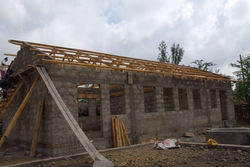“House after house that I went into, there were sick family members that needed help. And loved ones were trying to do what they could, but they were hopeless and lost as to what to do. They are sick with malaria and typhoid fever. There is no clinic or any help for these people in this area. They can’t get help if they have no money – and nobody has any money. People are dying. This weighs heavy on my heart.”
- Ken Adams,
visionary for the Maji Ya Chai hospital
HISTORY
Meet Pastor Peter Michael Nhonya. He is a pastor serving the Arusha area with a big heart and a big smile. He is willing to serve his community wherever needed and has a passion to tell others about Christ, even despite his own personal tragedy. His five-year old son contracted malaria, a disease that, while easily treatable,
kills at least a million people a year. Desperate to save his son, he rushed him to a clinic, but they would not treat him without paying first. Pastor Nhonya had no money but offered to sell his bicycle, and bring the money the next day if they would treat his son. They refused. His son died in his arms while they were negotiating.
His story is the story of 1,000 others in this region.
This sad reality gave birth to a dream and a determination to build a medical clinic where people could be treated regardless of their ability to pay. If the patient can't pay it all at the time of service, then they would be allowed to pay over time. If they can’t pay it at all, then the patient would be allowed to work off the bill at the clinic.
Losing a child in your arms will no longer be an option.
VISION
-
That the hospital should serve patients regardless of payment ability.
-
To diagnose, write prescriptions and distribute medicine as needed.
-
To offer vaccines and antibiotics that will treat common disease. To offer prenatal and postnatal care. To set broken bones and stitch wounds. To offer dental and vision in the future.
-
To be a training facility for locals and students in the trade school. To train assistants, midwives, nurses and doctors.
-
To improve quality of life.
-
To partner with medical professionals in the U.S. who can give their time and resources to supporting the hospital.
-
To provide a sanitary facility, including clean water.
-
To develop a medical board that will maintain safety and sanitary standards.
-
Maintain quality of care that locals can trust.
FACTS
-
There is currently no hospital serving this immediate area. The city of Arusha is 45 minutes to an hour away, for the few who are privileged enough to have access to a car. While it does have a hospital, there is no option to be treated without payment up front.
-
One child dies of malaria in Africa every 30 seconds.
-
Inexpensive medicines, vaccines and preventative measures would save the lives of hundreds of children and adults.
-
Unnecessary death due to disease and lack of vaccines does not have to be a way of life. Neither does infant mortality, crippling or maiming. Education is also important in extending life expectancy.
-
Typhoid fever is rampant due to lack of access to clean water. An estimated 22 million contract the disease each year. Most cases see improvement within days… but only when given antibiotics, which few can afford. Clean drinking water would significantly reduce the number of deaths.
 |  |
|---|---|
 |  |
 |  |
 |  |
 |